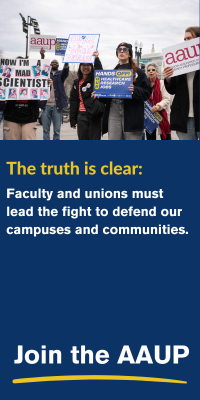- About
- Programs
- Issues
- Academic Freedom
- Political Attacks on Higher Education
- Resources on Collective Bargaining
- Shared Governance
- Campus Protests
- Faculty Compensation
- Racial Justice
- Diversity in Higher Ed
- Financial Crisis
- Privatization and OPMs
- Contingent Faculty Positions
- Tenure
- Workplace Issues
- Gender and Sexuality in Higher Ed
- Targeted Harassment
- Intellectual Property & Copyright
- Civility
- The Family and Medical Leave Act
- Pregnancy in the Academy
- Publications
- Data
- News
- Membership
- Chapters
Statement on Wisconsin Presidential Search
In November 2019, following the announcement of current University of Wisconsin system president Ray Cross’s retirement, the president of the board of regents of the UW system, Drew Petersen, appointed a nine-member presidential search committee. In a departure from decades of institutional precedent and widely accepted standards for academic governance, he did not include any faculty members on the search committee.
The Wisconsin AAUP conference and the American Federation of Teachers–Wisconsin Higher Education Council issued a joint statement in response, decrying the “shocking level of disrespect . . . and troubling lack of humility on the part of the Regents” and presenting two resolutions aimed at improving the search process.
The Association’s Committee on College and University Governance also issued a statement, citing “widespread concerns about the composition of the presidential search committee and its implications for the process of selecting the UW system’s next leader.” The statement points out that “in its decision to exclude faculty and staff representatives, the board has demonstrated its willingness to ignore not only the interests of the citizenry it represents but long-standing and widely recognized norms of academic governance.”
The statement notes the position of the Association calling for faculty participation in presidential searches. According to a national survey of governance practices published in 2001, such participation has been widely practiced: 94 percent of surveyed institutions included faculty representatives on their presidential search committees.
The statement further observes, “In appointing the current presidential search committee, the UW board of regents has ignored these broadly accepted principles and procedures. It has also disregarded its own established precedent, followed in each of the last three presidential searches since 1991, of including voting members of the faculty and academic staff on search committees.” It concludes by calling on the board “to realign itself with traditional norms of academic governance, as well as with its own decades-long practice, by immediately expanding the presidential search committee to include a significant number of elected faculty, academic staff, and student representatives as voting members.”
Board president Petersen announced in December that the composition of the committee would not be changed.



